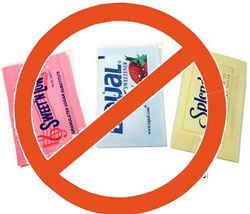Every new day is another chance to change your life. Individuals have found themselves suffering from teeth problems and other illnesses either conscious of the cause or unconscious.The times in life, that seem to be the worst, always turn out for the best! Live your life without regret, don’t be someone who they’ll forget.


Every new day is another chance to change your life. Individuals have found themselves suffering from teeth problems and other illnesses either conscious of the cause or unconscious.
The times in life, that seem to be the worst, always turn out for the best! Live your life without regret, don’t be someone who they’ll forget.
Artificial sweeteners, also called sugar substitutes, are substances that are used instead of sucrose (table sugar) to sweeten foods and beverages.
Because artificial sweeteners are many times sweeter than table sugar, smaller amounts are needed to create the same level of sweetness.
Questions about artificial sweeteners and cancer arose when early studies showed that cyclamate in combination with saccharin caused bladder cancer in laboratory animals.
However, results from subsequent carcinogenicity studies (studies that examine whether a substance can cause cancer) of these sweeteners have not provided clear evidence of an association with cancer in humans.
"Similarly, studies of other FDA-approved sweeteners have not demonstrated clear evidence of an association with cancer in humans.” Soffritti M, B. (2005); European Journal of Oncology.
Whether your goal is cutting calories or eating healthier, options for sugar substitutes abound. Understand their pros and cons to make an informed choice.
Artificial sweeteners were designed to be sugar substitutes as a less fattening alternative. You find sugar substitutes in diet sodas, yogurt and such.
These artificial sweetener additives mimic the flavor of sugar but with virtually no useful energy.
There are five dangerous sugar substitutes that are approved for consumer use: saccharin, neotame, acesulfame potassium, aspartame, and sucralose.
Of the five, sucralose and aspartame are the most pervasive and dangerous substitute found in products on store shelves today.
This relatively new additive is marketed under the name Splenda. Sucralose is basically denatured sucrose. Its preparation involves chlorinating sucrose, chemically changing the structure of the sugar molecules by substituting three chlorine atoms for three hydroxyl groups.
Splenda is probably one of the worst offenders of claiming to be "healthy” as they say that it’s made from real sugar. Don’t be fooled! It’s still an artificial substance.
What they don’t tell you is that Splenda is actually a chemically modified substance where chlorine is added to the chemical structure, making it more similar to a chlorinated pesticide than something we should be eating or drinking.
This is one of the biggest misconceptions that I see all of the time and it saddens me to see so many people poisoning their family with dangerous artificial sweeteners like Splenda, while falsely thinking they’re doing something healthy.
The truth is that artificial sweeteners are not even close to being healthy, and as you’ll discover in a minute, can easily be just as bad for you, if not worse, than sugar or corn syrup.
Most people think that they are doing something good for themselves by choosing the "diet” drinks or "lite” yogurts compared to the sugar-laden versions, but the problem is that you’re exposing yourself to a whole new set of problems with the artificially sweetened drinks and foods.
I know you’re probably frustrated by all of the contradicting messages you hear each day about which foods are good for you and which are bad.
I’m sure just today you probably saw some clever ad or commercial somewhere screaming health benefits for a food product that is loaded with artificial sweeteners.
I’m sure you already know the problems with sugar or high fructose corn syrup sweetened products. The excess empty calories, blood sugar spike, and resulting insulin surge this creates in your body not only promotes fat gain, but also stimulates your appetite further, making things even worse.
On the other hand, artificial sweeteners save you calories, but there’s growing evidence that they can increase your appetite for sweets and other carbohydrates causing you to eat more later in the day anyway.
Therefore, you don’t really save any calories at all. Also, studies have shown that artificial sweeteners can stimulate high insulin levels in your body too, which again can promote fat storage.
All of the 4 artificial sweeteners listed above are nasty chemicals that the human body is simply not meant to ingest. However, most of us are ingesting a whole lot of these chemicals on a daily basis.
Aside from the problems I touched on so far, other health issues that have been related to artificial sweeteners in scientific studies as well as observations are: some have been linked to potential cancer risks, negative effects on the liver, kidneys, and other organs, stimulating cravings, gastrointestinal problems, developmental problems in children and fetuses, headaches and too many more issues to list.
Regardless of the fact that any real health problems for actual human use are not proven yet, I don’t know about you, but I’d rather protect myself and my family and steer clear of these possibly dangerous artificial chemicals.
Of course, despite all of the health issues potentially associated with artificial sweeteners, the companies that sell the products will continue to claim that they are fully safe. Don’t believe them! The bottom line is that the body was not designed to deal with foreign substances like artificial sweeteners.


